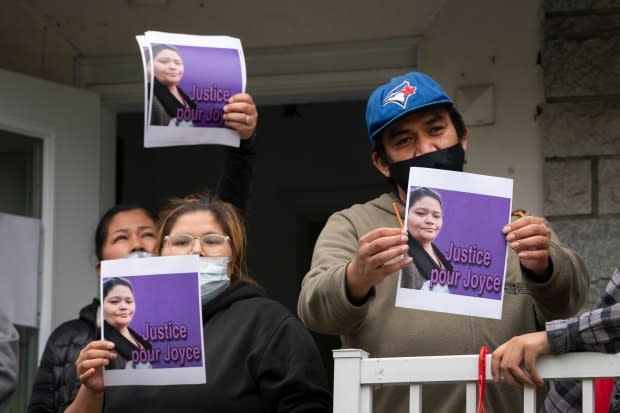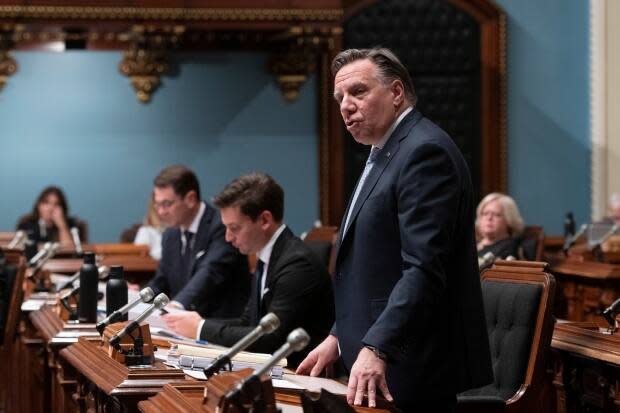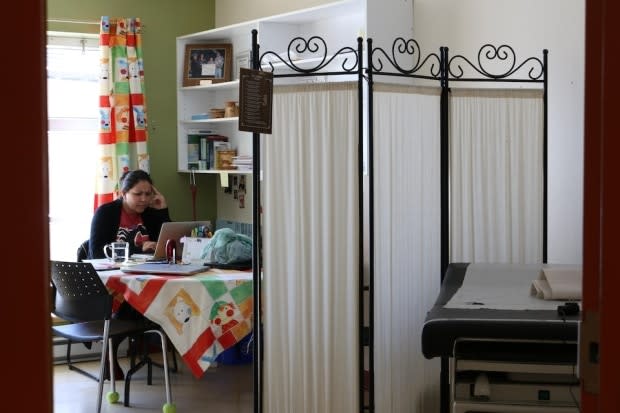Quebec doctor asks peers to 'stop dragging our feet' in fight against systemic racism
Dr. Pascale Breault's patients at the health clinic in Manawan, Que., an Atikamekw First Nation about 200 kilometres north of Montreal, often begged her not to be sent to the hospital in Joliette for treatment, "for fear of not being understood, of not being heard, of being denigrated."
The family physician shared her experience in a Facebook post this week, as the Atikamekw community mourned the loss of Joyce Echaquan, 37, who died on Sept. 28 at the Centre hospitalier de Lanaudière in Joliette.
Before her death, two days after being admitted to the hospital with stomach pains, the mother of seven used her phone to record medical staff hurling racial slurs and insults at her. A nurse and an orderly have since been fired, and a number of investigations have been launched.
In an interview with CBC News, Breault, who is white, candidly looked back on her conversations with her patients, realizing she'd often tried to convince them to go to the Joliette hospital, despite their fears.
"At best, I'd tell them, 'I don't have a choice but to send you down to Joliette.' In the worst cases, I was giving them a justification, which was not based on their narrative but on mine," she said.
Her Facebook statement, which calls on all health-care providers to examine their role in perpetuating systemic racism in Quebec and to "stop dragging our feet," has been signed by 257 Quebec doctors.
"A big part of this comes with self-reflection — this is why I wrote the piece," Breault said.
Her colleague at the Manawan pediatric clinic, Jolianne Ottawa, said that over her years working in health care, including at the Joliette hospital, she continued to see discriminatory practices and tried to bring them to the attention of her peers, without success.
Ottawa, who is currently completing her nursing degree at Laval University, was a nursing intern there in 2003 when a senior nurse told her group of students "to be careful when taking the blood sugar levels of Indians, because they have dirty nails."
It was just one of many racist incidents she said she witnessed — and flagged as inappropriate — during the following six months there and during her career as a health-care worker in Manawan.

Ottawa brought those concerns to the Quebec government in 2018 through her testimony at the Viens Commission, which was launched to inquire into the public services received by Quebec's Indigenous people.
"I often said, 'Are you going to wait for a tragedy before doing something'?" Ottawa told CBC.
The tragedy ended up hitting her own family: Her cousin, Carol Dubé, is Echaquan's spouse.
"This morning, he told me that he's lost his queen. It just broke me," Ottawa said over the phone.
The Echaquan family has voiced its frustration with Quebec Premier François Legault for his refusal to acknowledge systemic racism in Quebec, and they withdrew his invitation to attend Echaquan's funeral, held Tuesday in Manawan.

Legault issued a public apology in the National Assembly. On Thursday, he said he was going to "get involved personally" to fast-track the implementation of the 142 recommendations issued in the Viens report, 34 of which are targeted at health and social services.
"We have to be two to negotiate," said Legault. "We have 11 nations: some of them don't want to sit with us, some are asking for too much money — it's not easy."
Some health boards have made progress
In Ottawa's view, hearing the executive director of the CISSS de Lanaudière, Daniel Castonguay, say he was "shocked" to learn of such racist remarks among his staff shows that the administration of the regional health board has not taken any steps to address racism.
"We need to have people from the community sitting on their board of directors or taking part in their action plan," she said.
Some regional health boards have made more progress on that front, including at the CISSS Côte-Nord, on Quebec's North Shore.
Later this month, the board of directors of the CISSS Côte-Nord will begin discussions, in collaboration with Innu leaders in the area, to establish priorities for the health services needed in the community, said Dale Walker, a liaison officer for the region's Indigenous patients.
"The needs are growing, the population is aging," Walker said.

Eight Innu villages and one Naskapi community — with a total population of nearly 15,000 — rely on the hospitals in Sept-Îles and Baie-Comeau for health care.
The CISSS Côte-Nord has provided the services of an interpreter for several years in Innu, Naskapi and English, in both Sept-Îles and Baie-Comeau.
That's also the case at the hospital in the city of La Tuque, in the Mauricie region of Quebec, where an Atikamekw interpreter is on site five days a week to accompany patients from Wemotaci, a First Nations reserve.
Cultural practices integrated
Access to health care in one's mother tongue is crucial, said Mary Coon, a Cree elder who recently retired from the Wemotaci Health Centre as a consultant. It's particularly important when dealing with mental health problems or trauma, she said.
"People go to centres and can't speak their language," Coon said, making it much more difficult "to deal with the hurt they carry."
She witnessed the gradual introduction of culturally sensitive practices at the hospital in La Tuque, 115 kilometres east of Wemotaci.

Women can now bring home their placentas after childbirth to bury them, a traditional Atikamekw custom that honours the child's first home, Coon said.
Over the summer, renovations at the hospital also included the construction of a larger family room to allow Atikamekw families to gather to accompany elders in palliative care.
The La Tuque and Trois-Rivières hospitals are under the umbrella organization of the CIUSSS de la Mauricie—Centre-du-Québec, which hired Jennifer Petiquay as its liaison officer in December 2018.
Petiquay said she helps administrators adapt policies and ensures the files of Indigenous patients "don't fall through the cracks" when they are followed by both their local health centre and the larger hospitals.
"The CIUSSS saw this as a priority and made the effort that was needed," Petiquay said.
She also offers cultural sensitivity training to staff within the CIUSSS.
"Ideally every single employee would follow this kind of training, so that's something we'll be thinking about," Petiquay said.
The CISSS de Lanaudière refused CBC's interview request.
In an e-mailed statement, a spokesperson said Daniel Castonguay has been in contact with Manawan Chief Paul-Émile Ottawa. A meeting is set to be held shortly, which will allow an "updated portrait of the next steps to be taken."


